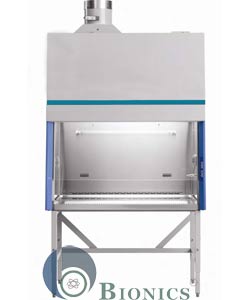The Growing Craze About the microbiological safety cabinet
The Growing Craze About the microbiological safety cabinet
Blog Article
Class 2 Biosafety Cabinets – Vital for Lab Safety and Biological Containment

Modern laboratories prioritise safety for workers, materials, and environments. Whether it's biotech development, pharmaceutical research, or microbiological analysis, biosafety cabinets play an integral role in contamination prevention and sample integrity.
Among the available options, Class 2 Biosafety Cabinets stand out for their balanced protection. These units are essential for labs working with infectious materials or clinical diagnostics.
Overview of Biosafety Cabinets in Laboratory Environments
Biosafety cabinets are airflow-controlled workspaces engineered for microbiological safety. They use advanced filters to trap harmful particles before air re-enters the lab.
These units are generally classified into Classes I, II, and III depending on airflow and application needs. Among these, Class II units strike a balance between user, product, and environmental protection.
What Are Class 2 Biosafety Cabinets?
Class 2 Biosafety Cabinets offer simultaneous protection for people, processes, and surroundings. They utilise downward laminar airflow within a sealed system.
Both incoming and outgoing air are HEPA-filtered to maintain sterility and prevent leaks. These cabinets are frequently used in labs handling infectious agents or clinical samples.
Key Features of Microbiological Safety Cabinets
A Class 2 microbiological safety cabinet includes several critical technologies such as:
• High-efficiency air filters to ensure clean workspace air
• Steady air movement to reduce airborne particle circulation
• Pressure differentials that maintain internal containment
• Germicidal UV lamps to disinfect the work area
• Low sound emissions to reduce fatigue
• Clear front panel for visibility and safety
These elements create a clean, contained, and user-friendly Biosafety Cabinets workspace.
Applications in Research and Healthcare
Class 2 Biosafety Cabinets are key equipment in healthcare, molecular biology, and quality control. They are ideal for safe handling of samples during testing and experimentation.
From universities to private pathology labs, Class 2 cabinets ensure lab hygiene and sample integrity.
Benefits of Using Class 2 Biosafety Cabinets
Using Class 2 cabinets offers multiple advantages including operator protection and experimental reliability:
• Protects the integrity of lab work
• Shields operators from harmful aerosols and pathogens
• Minimises lab contamination and pollution risks
These cabinets combine safety features with operational efficiency.
Cabinet Types and Global Compliance
Top manufacturers design units compliant with major biosafety regulations worldwide. Class 2 units are sub-classified as A1, A2, B1, and B2—based on varying airflow balance and ducting needs.
• Type A2: Most commonly used cabinet model
• Type B2: Suited for labs dealing with toxic agents
Matching the cabinet type to your process is essential.
How to Select a Class 2 Safety Cabinet
Before purchasing, consider:
• The biosafety level required (BSL-1, BSL-2, or BSL-3)
• Available lab space and utility infrastructure
• Ease of use, energy efficiency, and upkeep
• Manufacturer reputation and post-sale support
Consulting with experts ensures the cabinet fits both budget and compliance goals.
Safe Setup and Operation of Class 2 Cabinets
For optimal results:
• Minimise airflow interference during operation
• Ensure annual certification and airflow testing
• Educate staff on cabinet operations and safety
Operational best practices include:
• Maintain biosafety gear protocols
• Minimise hand movements inside the cabinet
• Decontaminate surfaces before and after use
• Use UV lights only when cabinet is off and unoccupied
Final Thoughts on Class 2 Biosafety Cabinets
Class 2 biosafety cabinets are vital equipment in laboratories dealing with biohazards. They ensure contamination-free experiments and personnel safety.
From clinical research to vaccine development, Class II cabinets maintain sterility in sensitive procedures. When investing in a biosafety cabinet, choose performance and reliability over cost-cutting—because lab safety is non-negotiable. Report this page